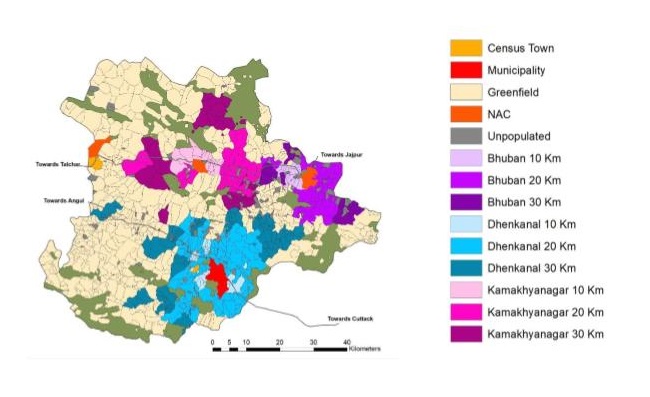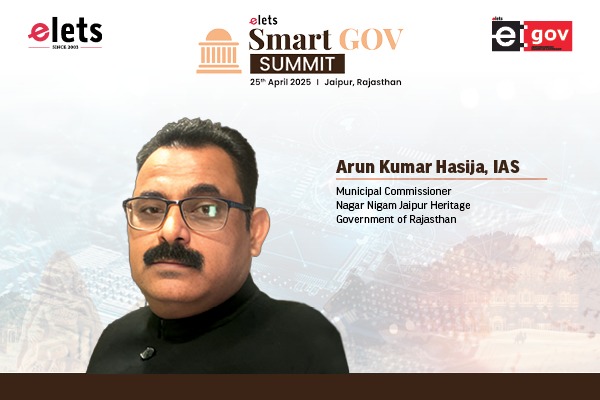
The Swachh Bharat Mission (SBM), the flagship sanitation scheme of the Government of India has revolutionized India’s sanitation landscape. However, there are still gaps which need to be bridged to sustain and build upon the success realized. This article by the UNICEF India water, sanitation and hygiene (WASH) team highlights why faecal sludge management is the next practical step to keeping India safe and clean.
India saw the exponential growth of household toilet coverage throughout the nation in large part because of the Swachh Bharat Mission (SBM), which was launched in 2014 by Prime Minister Modi with the objective of achieving an open defecation free (ODF) nation by 2019.

According to the Ministry of Jal Shakti’s (MoJS) dashboard, the rural component, dubbed SBM Gramin (SBM-G), met its goal against the baseline established when the Mission was launched, helping 706 districts and approximately 100 million households become ODF. However, while toilet coverage in households has been shown to reduce the risk of enteric infections according to some meta-analyses, it is only the first step of the entire sanitation chain, which follows the movement of human excreta from the toilet to its ultimate site of disposal and treatment.

Human excreta would not just need to be separated to limit direct contact with humans but also removed, transported, disposed and treated, and perhaps even re-used as fertilizer – with every step managed safely.

Faecal sludge management (FSM) is, therefore, a critical investment, for the sake of both human health and the safe management of environment and water, the latter of which India has already a constrained supply. An estimate by Centre for Science and Environment (CSE) found that Indians generate nearly 1.75 million tonnes of excreta daily, with urban areas producing 0.12 million tonnes of it; however, an estimated twothirds of the country’s households with toilets are not yet connected to sewer systems. Where does the sludge from unconnected toilets go? In large part, into our water systems and soils. In 2009, the Central Pollution Control Board (CPCB) reported that of the approximately 38,250 million litres of sewage – a mix of faecal sludge and other liquid and solid wastes – generated by tier I cities and tier-II towns, less than a third was being treated while the remaining was being disposed into water bodies, due to which three-fourths of surface water sources at the time were polluted. Last year, the National Green Tribunal (NGT), for instance, noted that the absence of sewer line in 1,700 unauthorized colonies of the nation’s capital – which houses approximately four million people – was one of the major sources of pollution of the Yamuna River.

There is also enough data that highlights the connection between water sources, health and faecal contamination. A study by Berendes et. al. in 2019 found that when children resided in communities with household toilets that discharged directly into open drains, they were more susceptible to enteric infection resulting in diarrhoea and other illnesses during flooding events. Another study by UNICEF in 2019 conducted in Odisha, West Bengal and Bihar found that on average, non-ODF villages are 11.25 times more likely to have groundwater contamination compared to villages where every household had a toilet. Ultimately, the resilience of both society and environment is weakened when FSM is not prioritized, especially in rural areas already disproportionately affected by existing inequities in access to nutrition and health services.
UNICEF, as a key technical partner on flagship programmes addressing access to water, sanitation and hygiene (WASH) services – in particular by children, women and marginalized groups – is therefore supporting state governments explore opportunities to expand FSM coverage. Given the current disparity in access to the entire chain between urban and rural areas, the focus is on finding sustainable and scale-able solutions that connect rural populations to management and treatment options. These efforts by UNICEF and other stakeholders converge with the launch of SBM-G Phase II in 2020, which seeks to shift focus to sustaining the gains realized by investing in the enabling environment around toilet use, from operations and maintenance support to solid and liquid waste management including FSM.
In Odisha, the Housing and Urban Development Department (HUDD) has been engaged in addressing FSM in cities since 2015, thanks to the launch of the Atal Mission for Rejuvenation and Urban Transformation (AMRUT). Since then, the Odisha government-supported nine towns to invest in FSM by constructing faecal sludge treatment plants (FSTP) in AMRUTsupported towns. Two medium-sized towns in the state, Dhenkanal and Angul, were selected for a pilot named Project Nirmal in 2014, in anticipation of advising the utilization of AMRUT funding in relation to FSM, with support provided to the state and district governments by Centre for Policy Research (CPR) and Practical Action as implementing partners. In 2018, after Project Nirmal was completed and had demonstrated the benefits of implementing FSM value chains, the Chief Minister at a national workshop organized by HUDD and the National Faecal Sludge and Septage Management Alliance demonstrated his commitment to making Odisha clean and healthy by proclaiming Swachh Odisha, Sustha Odisha, or ‘Clean Odisha, Health Odisha’. In the workshop, six such facilities in the state, including the Dhenkanal FSTP, were inaugurated and commissioned.
However, this led to new and key questions: What about the large and dense villages (LDVs) and rural areas in Odisha? How can they access a sustainable and fiscally viable FSM system? Therefore, to explore if there is a solution to be found in extending an established urban FSTP’s reach to the neighbouring gram panchayats (GPs), the Government of Odisha, UNICEF CPR are now collaborating on a pilot intervention using the Dhenkanal FSTP, one of the first in the state for small and medium towns, as a starting point for conversation.
In 2017-18, according to the SBM monitoring database, 96 per cent of all the toilets built, since the start of SBM in 2014 in Dhenkanal, were single pit and in 2018-19 only 40 per cent of toilets were single pits; the remaining for the latter year were reported to use the twin pit model. A rapid assessment conducted in the district’s rural areas in 2019 also suggested that there was a varied mix of toilet technologies in use and highlighted the need to explore how these various technologies could be catered to through a central FSM structure, like an FSTP. It was initially observed that in Dhenkanal, GPs and small towns were sometimes clustered around urban areas, which led to the idea of testing out whether they could be incorporated in the existing FSTP’s serviceable area. Based on learnings from Project Nirmal and AMRUT, the great influence that district-level administrations could have in improving uptake of FSM at the household and community level needed to be capitalized on to ensure any sort of success. This led to UNICEF and CPR working with the government to position the Dhenkanal district as a leader in the roll-out of the intervention, and as a pilot for modelling elsewhere. They are concurrently exploring how investments in FSM would fit into the larger solid and liquid waste management (SLWM) framework for the district as well as the state.
The Dhenkanal FSTP intervention, designed to be rolled out from 2019 to 2021, therefore, aims to:
-
Leverage the available urban FSTP facility in Dhenkanal to safely manage faecal sludge generated in the neighbouring GPs, census towns and LDVs, through the convergence of goals and requirements between the GPs and the municipality
-
Support SLWM pilots in GPs in identified greenfield1 rural locations, that integrate access to the Dhenkanal FSTP, which includes developing and disseminating IEC messaging and rolling out campaigns to promote uptake of existing and newly available services
Using GIS to map out the Dhenkanal municipality and the concentric populations surrounding it, adjoining GPs, census towns2 (CTs) and LDVs3 were located within 20 kilometres from the jurisdiction of the Dhenkanal municipality which was also clustered around three existing FSTPs – one in Dhenkanal and two upcoming in Bhuban and Kamakhyanagar. These ‘clusters’ were seen as feasible to serve using the existing and planned FSTPs based on feasibility and cost analyses that incorporated the cost of running the FSTPs, the transport or ‘cesspool’ trucks, the salaries of operators, equipment and products for the safe management of trucks and FSTP, etc. There is also an on-going study of village-based on-site systems, waste management practices and perceptions, and any existing FSM services known to various community individuals.
The connection between the Dhenkanal FSTP with the surrounding cluster will be operationalized through the passage of Municipal Council Resolution by the Dhenkanal Municipality, as well as resolutions by the concerned GPs. This intends to create a convergence model which can be replicated in the other cities and towns of the state and ensure that there is ownership by community and government leaders who can sustain the gains realized.
This intervention is first of its kind in the entire state, where systematic activities are being undertaken through a districtwide approach to plug in rural areas within the existing FSM solution available at a municipality level. This effort is a step towards managing the waste of the entire district of Dhenkanal, therefore, will address the issue of environmental pollution and contribute significantly to the future management practices of ground and surface water sources, which in turn will affect Indians’ access to clean and drinkable water. This, in turn, will support the communities being served in being healthier and live in contamination-free environments for children to play and thrive in.
(Special recognition goes to UNICEF’s Odisha WASH team, Shipra Saxena and Narendra Singh Chouhan, and the Centre for Policy Research’s Scaling City Institutions for India (SCI-FI) focal point, Anju Dwivedi, for their ongoing support to this project. Thanks to Swathi Manchikanti, WASH Specialist with UNICEF’s Delhi office, for her editing support)
(If you have any questions about UNICEF-supported FSM work in India, send your inquiries to Sujoy Mojumdar, WASH Specialist, at smojumdar@unicef.org)
Be a part of Elets Collaborative Initiatives. Join Us for Upcoming Events and explore business opportunities. Like us on Facebook , connect with us on LinkedIn and follow us on Twitter, Instagram.
"Exciting news! Elets technomedia is now on WhatsApp Channels Subscribe today by clicking the link and stay updated with the latest insights!" Click here!













